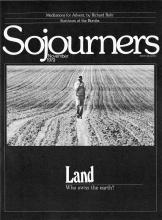A recurring Old Testament motif is God's concern for the distribution of land. After the conquest of Canaan every tribe and family received a parcel of land. God decreed that these allotments were not to pass out of the hands of the family: "The land shall not be sold in perpetuity, for the land is mine; for you are strangers and sojourners with me" (Leviticus 25:23).
Yahweh required that the land be used to establish a just society in which everyone had equal access to the earth's fruits. The Israelites' neglect of this land stewardship became for God's judgment on them: "Woe to those who join house to house, who add field to field, until there is no more room, you are made to dwell alone in the midst of the land" (Isaiah 5:8).
In the New Testament, Jesus was concerned with the intent of God's law, and the laws regarding land remind us that such resources are a gift of God intended for equal use by all. The session of land brings with it a mission and obligation to make of it what God intends.
In one of the darker aspects of North American history, we have repeatedly denied the native peoples access to the products of the land. The words of Micah accurately depict our actions: "They covet fields, and seize them, and houses, and take them away; they oppress a man and his house, a man and his inheritance" (Micah 2:2).
Since our livelihood today is no longer derived directly from the soil, it is not essential that every family retain its plot of land. However, for the Inuit, the Cree, the Yukon Indians, the Dene, and the other native peoples of North America the land still plays an important role in their prosperity. If they lose their land they lose their spiritual and physical lives.
Read the Full Article

